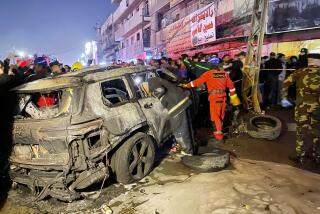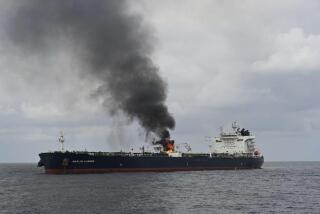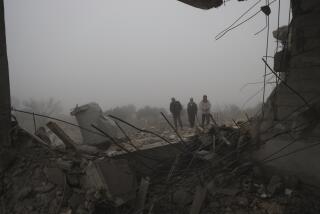Iraq’s Baiji oil refinery retaken from Islamic State
Iraqi government forces have fully liberated the strategic Baiji refinery from Islamic State militants, state media said Saturday, and military reinforcements were reportedly arriving at the embattled western city of Ramadi.
Airstrikes from the U.S.-led coalition continued to pound positions, with the U.S. Central Command on Saturday reporting half a dozen new strikes near Baiji and Ramadi, capital of Anbar province.
Islamic State launched large-scale attacks against the two western targets after being expelled from the northern city of Tikrit, which was retaken by government forces early this month after weeks of fighting.
Thousands of civilians, some waving white flags, have fled Ramadi in recent days as fierce fighting has engulfed the city, situated about 70 miles west of Baghdad, the capital.
Some Iraqi officials are worried that Ramadi will fall, which would mean that most of Anbar would be under the control of Islamic State and its allies. The predominantly Sunni province was a hot bed of resistance to American forces during the 2003-11 U.S.-run occupation of Iraq.
The Islamic State offensives demonstrate the militant group’s continued ability to strike, despite setbacks in Tikrit and elsewhere in Iraq. Analysts say the attacks also show how Iraqi forces are over-stretched as they struggle to win back the vast stretches of territory lost last year to the extremists.
State television reported Saturday that the militants had been expelled from the Baiji refinery, the nation’s largest. Other accounts indicated that clashes were continuing at the sprawling complex north of Baghdad.
Islamic State forces stormed the refinery last week, prompting a government counter-attack. The militants set fuel tanks ablaze as they were pushed back, Iraqi officials said.
The refinery has been out of operation since June, when Islamic State fighters seized much of central and northern Iraq, including the refinery and the nearby city of Baiji. Government forces retook the installation late last year after a fierce battle, but Islamic State fighters managed to fight their way through the perimeter again last week.
Both Baiji and Ramadi are largely Sunni Muslim cities where many residents initially welcomed the arrival of Islamic State, an Al Qaeda breakaway faction. The Sunni extremists have successfully exploited broad disenchantment among Iraq’s Sunni minority with the Shiite-dominated central leadership in Baghdad.
Both sides in the conflict view the refinery as a key strategic and symbolic asset.
Last week, Gen. Martin Dempsey, chairman of the U.S. Joints Chiefs of Staff, emphasized Baiji’s significance in comments to reporters in Washington.
“Once the Iraqis have full control of Baiji, they will control all of their oil infrastructure, both north and south, and deny ISIL the ability to generate revenue through oil,” Gen. Dempsey said, using an acronym for Islamic State.
Petroleum sales have been a major money-maker for the militant group, which has overrun oil fields in Iraqi and Syria. Islamic State sells both crude oil and refined products on the black market, generating significant income.
In the case of Ramadi, the Interior Ministry and various news organizations reported that additional military and police forces were being rushed to the besieged town. Amid widespread concern that Ramadi might fall, Prime Minister Haider Abadi ordered that “urgent” reinforcements be dispatched to the Anbar provincial capital.
Special correspondent Nabih Bulos in Amman, Jordan, contributed to this report.
More to Read
Start your day right
Sign up for Essential California for news, features and recommendations from the L.A. Times and beyond in your inbox six days a week.
You may occasionally receive promotional content from the Los Angeles Times.






